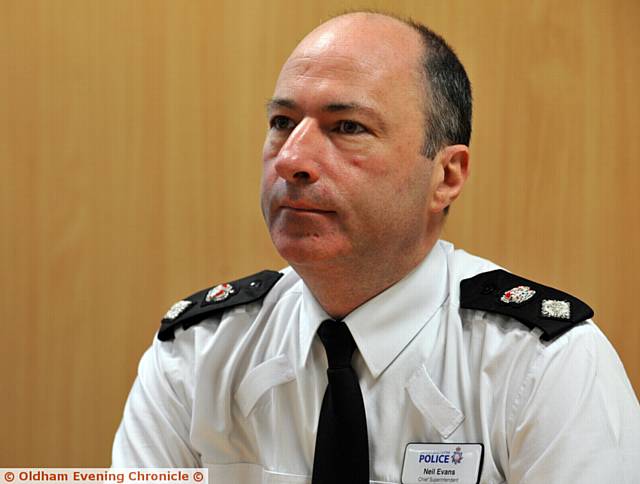Drug which put ten in hospital was Spice, not Ecstasy, say officers
Date published: 30 June 2017

CHIEF Supt Neil Evans
A DRUG which left ten people in hospital is a new more potent form of Spice and not Ecstasy, police say.
Tests have shown the drug at the centre of the scare in Oldham is crystalised Spice - the first time they have seen it in this more potent form.
Officers say that those hospitalised thought they were buying MDMA, a form of Ecstasy but in fact they had taken a powerful new form of the synthetic high commonly known as Spice.
Stable
It has also been revealed that a Rochdale man who died on Monday may not have taken the drug. However, with the results of toxicology tests not yet complete, police say it cannot be ruled out.
A spokeswoman said all the people who were taken to hospital are now in a stable condition.
Ch Supt Neil Evans, from GMP's Oldham and Rochdale boroughs, said: "This is the first time we have seen 'Spice' in crystalised and much more potent and unrefined form and it's now being mistakenly taken as MDMA.
"This is extremely worrying. Anyone thinking of taking MDMA must seriously consider what they are doing. You may feel that you know and accept the risks of taking MDMA but you never know what you are actually taking and the reaction your body could have to it.
"Last weekend a number of people suffered life-threatening side-effects after they took what they believed was MDMA. This weekend, before you think about taking MDMA or Spice, think, is your life really worth it?"
Nine men and one woman were taken to Royal Oldham Hospital over the weekend after they took a drug they thought was MDMA, also known as 'pink champagne' or 'magic' .
Officers issued an urgent warning to people to avoid taking the drug, which comes in crystal form.
GMP said a 26-year-old man had been arrested on suspicion of supplying Class A drugs but has since been released under investigation.
Police are now trying to find out where these drugs came from.
Anyone with any information is asked to contact police on 0161 856 9063, alternatively via 101 or Crimestoppers anonymously on 0800 555 111.




